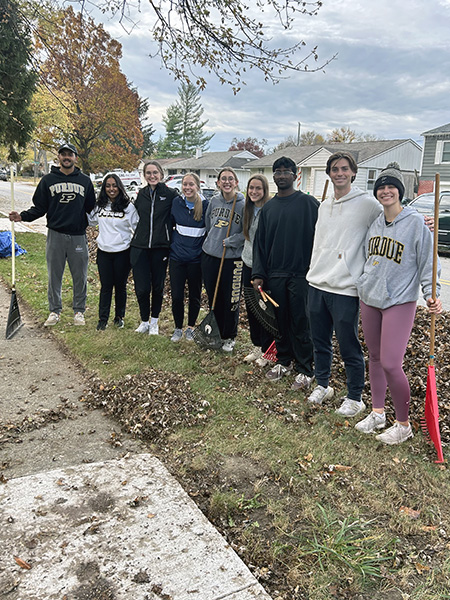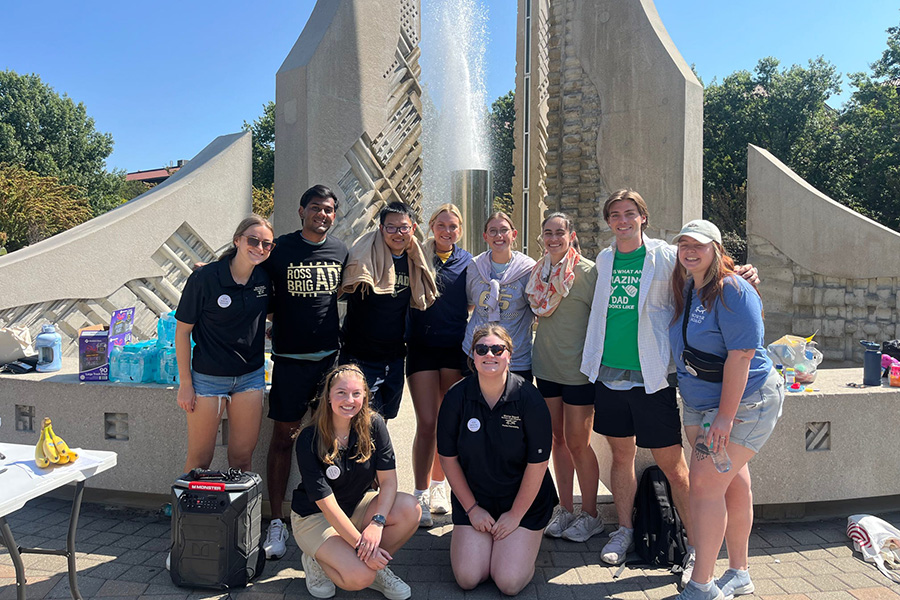ME student, Engineering Fellow Ford's Purdue journey highlighted by undergraduate research
All of the qualities that ultimately helped mechanical engineering student Luke Ford succeed as an undergraduate researcher also made him an ideal choice as a Purdue Engineering Fellow, the best of the best seniors in the College of Engineering.

Luke Ford was stoked.
His undergraduate engineering career path had been leading up to this moment — when he would secure an undergraduate research opportunity. So when he got the description of the project he’d landed with Guillermo Paniagua’s Purdue Experimental Turbine Aerothermal Laboratory (PETAL), he was raring to go.
Until he read it.
“Where do I even start? I don’t really know what any of this is. I don’t know how to do this,” realized Ford, then a junior in mechanical engineering at Purdue University.
Ford hadn’t taken a heat transfer class yet, and the project mostly was focused on heat transfer.
But all of Ford’s experience to that point — spending years in EPICS doing hands-on projects, joining the American Society of Mechanical Engineers in his first year in West Lafayette, rising to leadership roles in other organizations — prepared him to know how to tackle problems and where to go to get answers.
Being out of his comfort zone initially with research, really, was exactly where Ford needed to be.
“In my experience, that’s the best place for growth and for learning,” he said, “and that was definitely what I experienced through the project.”

Ford’s response to that research learning curve is one reason he was selected as part of an elite group in September 2024. All of the qualities that ultimately helped him succeed as an undergraduate researcher — so much so that Paniagua called him “among the elite of outstanding undergrad alums from my group” — also made him an ideal choice as a Purdue Engineering Fellow, the best of the best seniors in the College of Engineering.
“Staying curious and learning always has been a big part of what’s important to me,” Ford said. “Whenever content has been super difficult, for me, it’s really easy as an engineer to want to try to figure it out yourself. You want to be able to solve a problem. But, for me, it’s been really important to stay on top of academics and other things by understanding when I don’t know the answer when is the right time to ask for help? And where do I go to get that help?
“Admitting you don’t know the answer is an important skill and can really help you learn a lot more when you know you need to go to office hours, you need to talk to a professor, you need to ask your friend and work through something together. That’s been really important. I’m always just excited to try and go solve it, and if it doesn’t work out, I can talk to someone who knows better and they can help me understand.”
A ‘beautiful,’ comprehensive experience
Ford’s voice gets louder, and he struggles to sit still. The topic of research at PETAL has just been brought up, and his body physically manifests his excitement. He smiles. He moves his hands. His energy increases.
Of all the opportunities Ford has had during his time at Purdue — more than double digits with organizations, clubs and leadership positions — research is it. Even when he wasn’t quite sure if engineering was the path, Ford was drawn to research.
“When I thought of engineering when I was coming from high school — why do I want to get involved with engineering? — you think of hands-on (activity), applying the science, and I really thought of pushing industry forward or pushing knowledge forward in a particular field,” Ford said. “I think research is one of the ways people do that every day, exploring new things, new theories.”
Paniagua’s group proved to be the ultimate match.
Ford quickly found that being in a research environment would push him to use the things he learned in the classroom, different than a summer internship did. In research, there are new things every day but in a fun, fast-paced environment that allows Ford to explore what he’s interested in and build up a specialized tool set of skills.
In Ford’s first semester with the research group in January 2024, he had to understand tubings and fittings and mechanical parts; pumps and fluid mechanics; and heat transfer.
Except he didn’t understand most of it initially.
And that maybe was the best part.
Aubrey McKelvy, a PhD student, was Ford’s supervisor on the project. McKelvy would fill in the knowledge gaps during meetings and messages.
“He didn’t always have the answer, but he was able to help me understand where I needed to go next to find the answer myself,” Ford said.
There were other people on the team who could help as well, and Ford learned to utilize all the resources around him.
Ford naturally sought help from Paniagua, but Ford even approached other professors. Ford would simply ask, “Can we just go over this?” That included reaching out to a professor who taught heat transfer — before Ford had the course. That professor helped Ford get codes together, among other things.
“Bringing all of that into a project, I feel like research is really the place you can get an amazing, comprehensive experience and bring a lot of different fields together in a beautiful way,” Ford said.
Ford was responsible for finalizing the design of a new-temperature controlled system for the group’s research on sprays crossflow injection and presented to the team the final design concept during critical design review, interacted with vendors, handled procurement of parts and assembled the components in the wind tunnel, Paniagua said.
“Lucas excelled at his tasks while demonstrating an innate ability to think critically toward solving all the complex problems, eagerness to improve and learn from everyone in the research team,” said Paniagua, who has had more than 100 undergrads as research assistants.
“He is among the best undergraduate students I have had the pleasure of supervising.”
A student who, when applying to colleges, wasn’t even sure he wanted to be an engineer.
Intentional exploration
All of the colleges Luke Ford applied to in the “first round” were with a business major in mind.
Then COVID happened during his senior year of high school, and Ford was at his Chicago suburb house with “a lot of extra time on my hands.” He started paying more attention to the things in the world around him.
And an interest in engineering started to bloom.
Purdue’s Integrated Business and Engineering program, a partnership with the Mitch Daniels School of Business and the College of Engineering, turned out to be an ideal fit to explore business and engineering.
As soon as Ford got to campus, he intentionally targeted engineering opportunities to make an informed decision about his academic path. Ford enrolled in an Engineering Projects in Community Service (EPICS) project and joined the American Society of Mechanical Engineers (ASME), getting hands-on experience, learning CAD and participating in design teams.
“I fell in love with all the engineering stuff,” he said. “EPICS and ASME were the things that really accelerated me into a path in engineering.”
The list of activities and involvement only grew: Zeta Beta Tau, Boiler Gold Rush team leader, consultant for Purdue THINK, Rising Professionals, Mortar Board, member of the student advisory board for the Vice Provost of Student Life and Dean’s Leadership Scholar. Even now, in his final semester, Ford still is trying new things: He agreed to be a mentor for FYE students in West Lafayette.
Turns out, there was never such a thing as “too much.”
Not when Purdue has given so much.
“Whenever I can find a chance to give back to Purdue, (I do),” Ford said. “I just realized that this was a great decision for me to be here. That’s what motivated me to keep getting involved and to try different things where I could make an impact on campus and really just leave it better than I found it.”
There’s little doubt Ford has done that in his three-and-a-half years — but he’s not quite done.
Ford is pursuing ME’s combined BS/MS degree, so after graduating with the bachelor’s in May, he’ll return in the fall to pursue a master’s under Paniagua’s guidance. That means more time to strengthen bonds that have been so important.
“Different groups I’ve been a part of I feel like have really defined my time here,” Ford said. “I really enjoyed how I’ve been able to bounce between different groups and always have these different communities that have people I can rely on and make my time here better.”
Ford’s immediate post-graduate career already is secured.
As a junior, Ford was selected for the Department of Defense’s SMART Scholarship-for-Service Program that provided full tuition, annual stipends and employment with the DoD after graduation. Ford said he’ll likely be a flight test engineer at Edwards Air Force Base in California, and he’s excited for that next step.
He’s not the only one.
“He’s a rare blend of good engineering talent, generosity, enthusiasm and leadership skills that foreshadow a great future for him and those whose lives he touches,” a Fellows nominator wrote.
